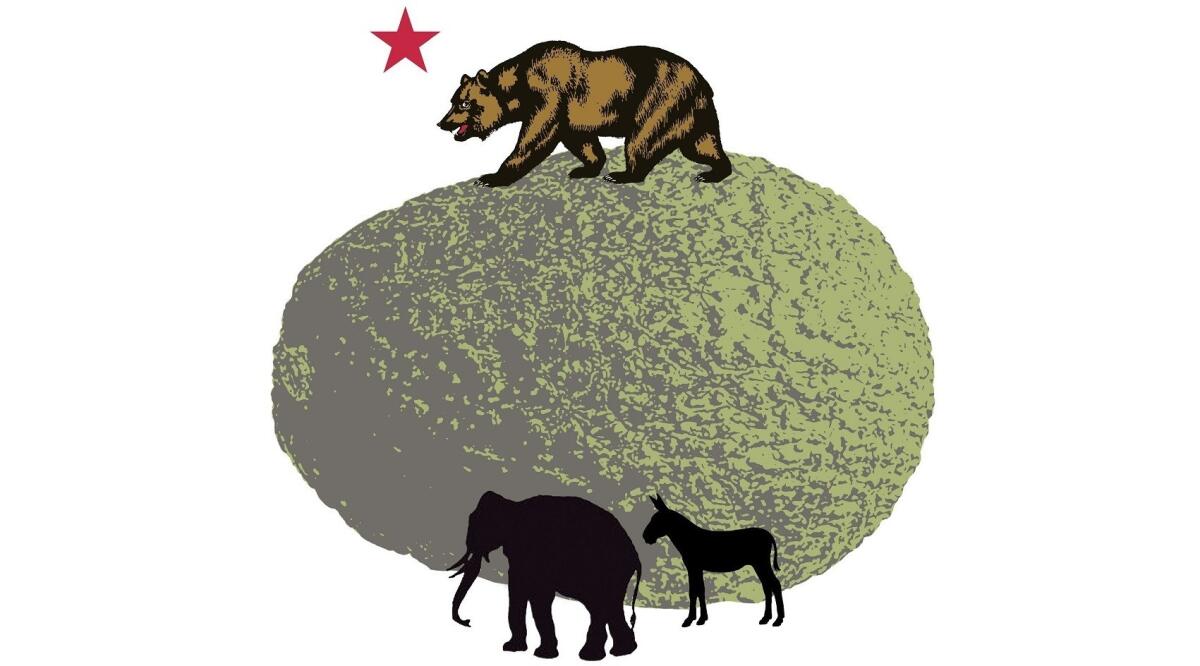Op-Ed: Conor Friedersdorf: Time is ripe in California for the Avocado Party

The elephant in the room of California politics is that the elephant is dead. Republicans hold zero statewide elected offices, are a tiny minority in the Legislature and make up just 28% of registered voters. The last time the GOP had a notable triumph over Democrats, a literal action hero emerged from rolling blackouts to save the day. He won’t be back.
Elephant carcasses are hard to remove, but leaving the GOP to rot won’t do. One-party rule isn’t good for democracy, no matter what party is in charge. When there’s no competition, there’s no incentive for our representatives to do their jobs — that is, to represent our best interests.
Consider Dianne Feinstein. The longtime senator voted for the catastrophic Iraq war. She repeatedly reauthorized the Patriot Act. She favors mass surveillance and a drone war that has killed hundreds of innocents. Her record does not reflect the will of this very liberal state, including its Democrats.
The majority in Sacramento is hapless and boneheaded, and not just because of silly laws like the one that was repealed when the public realized it forced bartenders to wear gloves. Former state Sen. Ronald S. Calderon (D-Montebello) was indicted last year, accused of accepting $88,000 in bribes. The year before, state Sen. Roderick D. Wright (D-Inglewood) resigned after being sentenced to 90 days in jail for perjury and voter fraud. A slim majority of the state’s voters disapprove of the Legislature’s job performance.
Yet the GOP keeps failing to offer a compelling alternative to either Feinstein or any number of mediocre state lawmakers.
To save California’s democracy, I propose the Avocado Party.
It would contest elections only in California. It would have no national ambitions. Although it would of course take time and patience for the Avocado Party to take hold — to ripen, if you will — the bar is low. If it won just a single statewide office, it would be more successful than the California GOP.
The Avocado Party would shun ideology and focus on winning a majority of votes. Its agenda would be a mash-up: It would attack the worst policies that the Democrats are pushing or failing to end, courting Californians of any or no political party.
There’s a lot of low-hanging fruit.
In U.S. Senate and House races, the Avocado Party could target politicians who’ve squandered blood and treasure in dumb wars, or used terrorism as an excuse to invade our privacy.
In state races, it could support fair pay for public servants, while standing up to the public sector unions that fight to keep the very worst teachers, cops and prison guards on the job.
Avocado politicians could be light green: pro-environment, but against symbolic measures that make working-class people worse off while doing little to actually improve the air, water or climate. The failure to reform the California Environmental Quality Act is a prime example. It is so often abused, often by NIMBYs to fight environment-friendly development, that legislators exempt their pet projects from its strictures. But Democrats refuse to repeal its worst provisions.
The Avocados could pledge to fix the safety net for California’s neediest, while promising to shrink the parts of the bloated bureaucracy that don’t help anyone, or only help interest groups. They could regulate businesses without piling on nonessential rules that drive entrepreneurs away.
Although the California GOP could adopt some of these stances, a revamped platform would do nothing to solve its image problem; the national GOP would still weigh down the state branch.
The Avocado Party would have an easier time winning in California than the GOP because it would be suited to our climate. It wouldn’t have any connection to reactionaries in other parts of the country who deny global warming or oppose marriage equality. It would have no national committee headquartered in Washington. And it would have no Donald Trump tainting the brand with attacks on immigrants.
There is precedent in California history for a third party to rise, fueled by widespread frustration with a broken system. Hiram Johnson and the Progressives flourished, beginning in 1912. In just a few years, their movement introduced the direct primary, the initiative process, the referendum and the recall. In L.A., they joined with the Anti-Saloon League to aggressively suppress bars. Yes, they went too far.
The Avocado Party would not be perfect either.
Its politicians would start out with a hard commitment to good government. Over time, they’d soften up to cut deals. Eventually, following the axiom that power corrupts, they’d rot, and Democrats or perhaps even Republicans would take over until a new batch of Avocados had time to mature.
That’s the natural cycle: Every political coalition spoils. As long as there are at least two viable parties competing for power, voters succeed in throwing out the bad actors and their bad policies.
But California doesn’t have two viable parties.
Waiting for the California GOP to reform itself no longer makes sense. The party has no present and no viable plan for the future. Why do we even have a state branch of a national political party if it has no prospect of winning statewide office?
I’ll leave the logistics of creating the Avocado Party to someone else. But I have a slogan ready for election day: “Would you like to add Avocado?”
Conor Friedersdorf is a contributing writer to Opinion, a staff writer at the Atlantic and founding editor of the Best of Journalism, a newsletter that curates exceptional nonfiction.
Follow the Opinion section on Twitter @latimesopinion and Facebook
More to Read
A cure for the common opinion
Get thought-provoking perspectives with our weekly newsletter.
You may occasionally receive promotional content from the Los Angeles Times.










